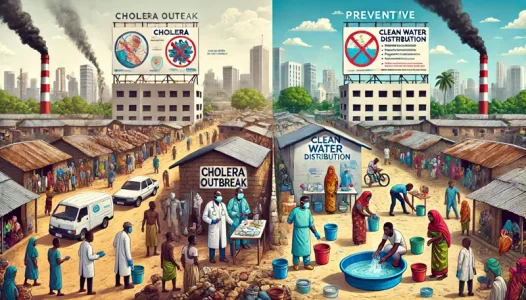
| Summary: Cholera, a severe diarrheal disease caused by Vibrio cholerae, can be life-threatening but is preventable with proper measures. This article outlines nine essential steps to protect yourself and your community. From drinking safe water and frequent handwashing to proper sanitation and food safety, these practical guidelines are designed to help you reduce the risk of cholera and maintain good health. Follow these steps to stay safe and cholera-free. |
Cholera, a severe diarrheal disease caused by the bacterium Vibrio cholerae, poses a significant health threat, particularly in areas with inadequate sanitation and limited access to clean water. Despite its potential severity, cholera is preventable. This article outlines nine essential steps to prevent cholera and ensure public health.
Drink Safe Water
Ensuring access to safe drinking water is crucial in preventing cholera. Only drink water that has been boiled, treated with chlorine or iodine, or bottled from a reliable source. Avoid consuming water from unknown or questionable sources.
Wash Hands Frequently
Regular handwashing with soap and clean water is a critical defence against cholera. Wash hands thoroughly:
- Before eating or preparing food
- After using the toilet
- After cleaning a child who has defecated
- After handling waste
Proper sanitation facilities, such as toilets or latrines, help prevent the spread of cholera. Ensure these facilities are well-maintained and used correctly. Avoid open defecation, which can contaminate water sources and increase the risk of cholera transmission.
Cook Food Thoroughly
Cook food thoroughly and consume it while it's still hot. Proper cooking kills the cholera bacteria, making food safe to eat. Avoid eating undercooked or raw food, which can harbour bacteria.
Store Food Safely
Store food in covered containers to protect it from contamination. Keep cooked food separate from raw food to prevent cross-contamination. Refrigerate perishable items promptly to avoid bacterial growth.
Wash Fruits and Vegetables
Wash fruits and vegetables with safe water before consumption. If safe water is unavailable, consider peeling them to reduce the risk of ingesting cholera bacteria.
Clean Living Areas Regularly
Maintain clean living environments by regularly cleaning surfaces and disposing of waste properly. A clean environment reduces the chances of cholera bacteria spreading.
Avoid Raw or Undercooked Seafood
Avoid consuming raw or undercooked seafood, especially in areas with prevalent cholera. Seafood can be contaminated with cholera bacteria, making it unsafe to eat unless adequately cooked.
Dispose of Waste Properly
Proper waste disposal is crucial in preventing cholera. Ensure that human waste is disposed of in a sanitary manner, and avoid dumping waste in areas where it can contaminate water sources.
Preventing cholera requires a comprehensive approach focused on maintaining good hygiene, ensuring access to clean water, and practising proper sanitation. By following these essential measures, individuals and communities can significantly reduce the risk of cholera and protect public health.




